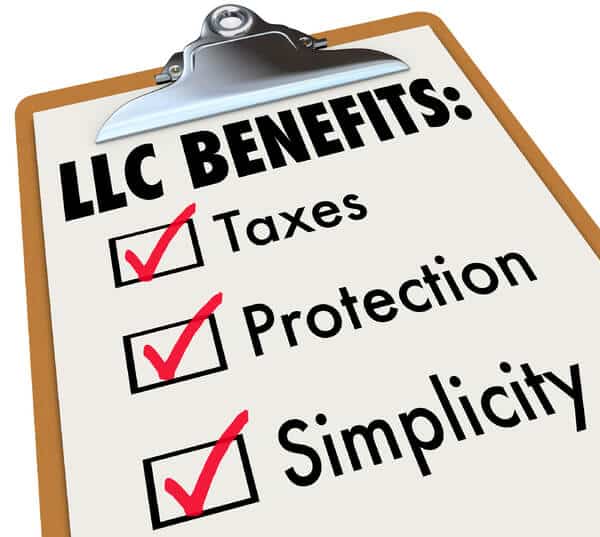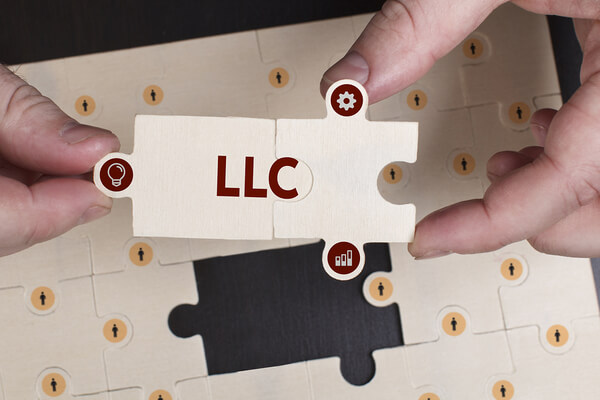A limited liability company (LLC) is a business structure that combines the benefits of both a corporation and a sole proprietorship or partnership. It offers pass-through taxation, if elected, with the added benefits of asset protection.
LLCs are an excellent solution for business owners in many situations, but they may not be the best choice for everyone. It is important to know the basics of LLCs as well as when they will work well for a specific type of business and when they may not.

Limited Liability Company Basics: Taxes and Asset Protection
Compared to other business structures, LLCs are relatively new. The LLC came into existence in the United States in 1977 when the Wyoming Legislature enacted the first state LLC legislation. Few states followed suit because of the unpredictability of the tax treatment of LLCs. However, the business structure became much more popular after 1988, when the IRS ruled in Revenue Ruling 88-76 that LLCs were eligible for partnership tax status. Every state, plus the District of Columbia, passed LLC legislation shortly thereafter. Today, the IRS considers the LLC a “check-the-box” entity, which means that LLCs are permitted to choose their tax classification: proprietorship, partnership, or corporation.
In addition to favorable tax treatment, LLCs also have unique attributes that shield their owners or members and management from personal liability for the debts and liabilities of the company. Any assets or funds beyond the investment in the company are protected from liability, just like a corporation. It also offers to charge order protection in many circumstances as well, which is similar to a limited partnership interest.

Forming an LLC
You only technically need one member to create an LLC. Nonetheless, multimember LLCs have certain advantages with regard to asset protection in some states.
To form an LLC, you must file the LLC Articles of Organization (or Certificate of Formation) required by your state. Most states have the specific form that you need on their website. This requires finding a name for your LLC that is not already in use.
You can usually search for a particular name that you have in mind by visiting the Secretary of State’s website. Then, use your newly created name to fill out the required forms and file with the designated state or county agency. You will also be required to pay a filing fee that varies from state to state.
The formation of an LLC is relatively straightforward, but it is important to complete all of the required steps. Jumping ahead without finishing the first step can result in unneeded expenses and hassle. It can take months for the state to approve your LLC application. If you start creating business cards and signs with the name and the application are rejected, you may have to start over if the request is denied. It is better to be patient and apply early.
Crafting Your Operating Agreement
Creating an Operating Agreement is an important part of LLC formation. The Operating Agreement sets out specific ownership responsibilities and rights. It also describes how your LLC will operate going forward. There are template operating agreements available, but it is important to tailor the agreement to meet the needs of your particular business.
While having an Operating Agreement is not technically a legal requirement for LLCs, it is an important practical step in the formation that you should not overlook. The Operating Agreement should address topics such as:
- Management structure
- Voting strategies
- Types of memberships (voting or non-voting, if desired)
- What will happen in membership changes
- Information regarding distributions
- Capital contribution
- Dissolution procedures
- Periodic meeting requirements (if any)
- Restrictions regarding binding the LLC
- Preference for alternative dispute resolutions (as opposed to litigation)
Developing the agreement should be a joint effort among all of the LLC members. Nonetheless, even single-member LLCs can benefit from having an Operating Agreement.
While you can create your own Operating Agreement, it may be a good idea to speak with an attorney about developing an agreement that will work for your unique circumstances.

Ownership and Control of LLCs
The LLC is owned by its members. Similar to shareholders in a corporation, any person or entity can be a member of an LLC. Members determine how an LLC will be managed; there is no set required management structure. Members can choose to incorporate a single manager, or all of the members can play a role in management. LLC members can even opt to employ a manager to act on their behalf. This manager does not have to have an ownership interest in the company to act in the name of the members.
“Member-managed” LLCs usually involve all of the members, and they have equal authority to make decisions on behalf of the LLC. This organizational structure works well for LLCs that have just a few members or involve family members.
“Manager-managed” LLCs elect a manager or board of managers to control the business matters of the company. Then, the remaining members take a “back seat” and become more like passive investors.
This flexibility adds to the many benefits of LLCs. In fact, members can even choose to shift from one organizational structure to another, which may be helpful as the business grows. In addition, the particular management structure has no impact on the tax benefits of the LLC. However the members decide to manage the LLC, the specific structure should be outlined in the Operating Agreement.
LLC Benefits for Specific Business Types
LLCs work well for a variety of businesses, regardless of the type or specific industry in which it participates. They are extremely flexible and can be tailored to meet the needs of virtually any company.
It is popular among family businesses because it can restrict voting rights to particular owners while also having reliable asset protection. LLCs can also be used for single-member businesses, but they have some nuances regarding asset protection that are important to consider.
In addition to asset protection and favorable tax treatment, the benefits of an LLC also include fewer filing and recordkeeping obligations compared to a corporation. As such, they are also generally more cost-effective to maintain. Being cost-effective is obviously a significant benefit for any business, but it is especially appealing to smaller businesses that may have tight budgets to consider.

Asset Protection and LLCs
Generally speaking, there are two types of asset protection that you should consider when choosing a business structure.
Corporate Veil Protection. When most people consider asset protection, they usually think of corporate veil protection first. This type of asset protection protects your personal assets from business liabilities or debts. That is, creditors cannot come after your personal property if your company owes them money. Corporate veil protection is commonly associated with corporations, but other types of businesses offer this protection as well, including LLCs
Charging Order Protection. This kind of protection is essentially the opposite of corporate veil protection. Charging order protection keeps business assets and property safe if you are sued or owe creditors money for personal reasons. LLCs offer this type of protection in most situations, but not always. It is important to know when this type of protection is available as some states do not recognize certain LLC structures as having charging order protection. In some states, Limited Partnerships may also offer to charge order protection.
Special Considerations for Asset Protection and Single Member LLCs
Limited Partnerships and Multi-member LLCs have a distinct advantage over Single-member LLCs when it comes to asset protection. The fundamental charging order philosophy was that one partner’s interests were protected if another partner was sued. That is, the other partner did not do anything wrong, so it would be unfair to take partnership assets just because one partner was sued in his or her individual capacity. It also did not make sense for creditors to take the place of a particular partner who owes a debt because that would be to the detriment of the other partners, who would then have no say regarding their business partners.
The same concerns are simply not there in single-member LLCs. As a result, the courts in some states have distinguished single members LLCs from multi-member entities because there is no innocent partner’s interest to protect. Although several state legislatures have given charging order protection to single-member LLCs, bankruptcy courts are disallowing it. As a result, the single-member LLC may technically be a separate legal entity from the person being sued, but the innocent victim rationale does not readily apply.
Single-member LLCs may still be a good asset protection tool if it is held by a multi-member LLC or Family Limited Partnership. This extra layer of protection means that the single-member LLC can protect individual assets from each other, while the enhanced protection of the Limited Partnership would protect the entire structure from outside creditors.

When an LLC May Not be the Best Choice
There are obvious concerns regarding asset protection and single-member LLCs, but there may also be other reasons that an LLC might not be the best option for your particular business. For example, LLCs have limitations on how many investors or members they can have. For large businesses or companies that anticipate “going public” in the near future, this restriction may be a problem. In those situations, a corporation may be the better choice. Nonetheless, conversion based on these future growth considerations is usually an option.
In most situations, an LLC is going to be the best choice for your business, particularly because you have significant flexibility regarding organization and structure. But, this is not always the case. Learning more about LLCs in your state is especially important when deciding which business structure will work best for you. The resources at Protect Wealth Academy can be a huge help in making this decision. Sign up for a free membership to get access to our extensive video library.




